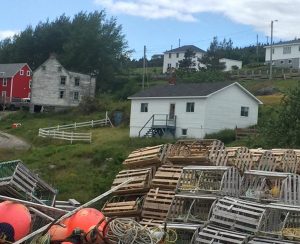
Lobster traps in King’s Cove, NL.
Many rural communities and regions in Newfoundland and Labrador are facing threats to their long-term sustainability. Challenges such as demographic decline, changing markets, and environmental threats such as climate change coalesce on small communities which often have limited capacity to address these complex problems.[1] One approach that many communities and regions have taken to address these challenges in a holistic manner is to utilize local data in a decision-support framework to guide a common agenda for regional sustainability planning.[2] When done in a participatory process in which local stakeholders are involved in identifying a common vision, goals, and strategies to address a wide range of ecological, social, cultural, economic, and institutional priorities, communities and regions can initiate a process of participatory sustainability monitoring that engages community members in more holistic and collaborative forms of regional governance.[3]
The Maintaining Regional Sustainability in Rural NL project is intended to highlight existing community-based initiatives whereby residents in rural regions have begun to monitor, plan, and implement an agenda for social, environmental, and economic sustainability. Commenced in 2016, over time this project intends to include multiple case studies of rural regions across Newfoundland and Labrador. These case studies aim to exemplify the variety of methods and approaches that rural regions can use in pursuit of participatory sustainability monitoring. Including approaches such as sustainability indicator (SI) frameworks, asset mapping, and agenda-setting processes, these techniques embody how community members can better integrate local knowledge and official data in informed and participatory decision-making.

The Kootenays region, BC, home of the ‘State of the Basin’ sustainability indicators project. Photo credit: Kelly Vodden.
This project aims to learn from other rural and resource-based regions in Canada and elsewhere that have taken innovative approaches to measuring and mobilizing local well-being assets to advance sustainable rural development. Some regions that could offer valuable lessons include the Kootenays region of BC, whose ‘State of the Basin’ report has been maintained to showcase key indicators of regional sustainability since 2012,[4] and the Naskapi Nation on the Quebec-Labrador border who have recently identified local measures of well-being.[5] In all of these approaches, rural sustainability is best assessed through an Asset-Based Community Development mindset, which focuses on strengths and capacities that are often overlooked in more needs-based models of development, allowing for communities to build on their strongest assets in new development initiatives.[6] This mindset is all about starting with what is strong about rural and resource-based regions, instead of what is thought to be wrong with them. From this starting point, the driving question for monitoring regional sustainability is “where are we now, and where do we want to go?”

The community of Barr’d Islands, one of over 10 communities on Fogo Island.
The purpose of this project is two-fold. First, it intends to facilitate information sharing and learning among rural regions. By sharing the outcomes of locally-based monitoring initiatives publicly, this project hopes to raise awareness in rural regions across the province so that different regions can learn from one another’s efforts and innovate together. In addition, a number of tools exist at the provincial or regional level, such as the Newfoundland & Labrador Cultural Heritage Inventory,[7] Functional Economic Regions,[8] and Community Accounts,[9] which have the potential to be used more effectively and integrated in application. Secondly, this project aims to build a toolkit of effective sustainability monitoring practices in rural regions. By highlighting case studies where local monitoring has contributed to tangible progress towards identified sustainability goals, we aspire to demonstrate the potential for participatory monitoring initiatives to be a catalyst for more sustainable forms of governance in rural regions. Ultimately, we hope that these tools and resources can inform more inclusive and sustainable regional governance in Newfoundland and Labrador and beyond.
This project is part of the Rural Resilience research group, which is an engaged community of research and practice dedicated to advancing the resilience and sustainability of rural Newfoundland and Labrador. Rural Resilience is based out of Grenfell Campus of Memorial University but its network extends across Canada and internationally. For more information about Rural Resilience, visit its website here.
